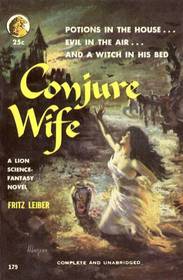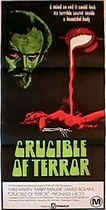Our editor-in-chief Nate Yapp is proud to have contributed to the new book Hidden Horror: A Celebration of 101 Underrated and Overlooked Fright Flicks, edited by Aaron Christensen. Another contributors include Anthony Timpone, B.J. Colangelo, Dave Alexander, Classic-Horror.com's own Robert C. Ring and John W. Bowen. Pick up a copy today from Amazon.com!
Cold Reads: Conjure Wife by Fritz Leiber
One of the best things about writing literature reviews for Classic-Horror.com is getting the chance to expose readers to writers who may have previously gone undetected on the horror fan radar. Fritz Leiber is just such a scribe that many will most likely admit to having never heard of. Getting his start in those lovely pulp magazines of the 1930s and 40s, Leiber was a talent whose unique emphasis on supernatural horror occurring in modern society was considered revolutionary in its approach. If you go in expecting to hear of morbid gents digging around in eldritch tombs or fearless heroes slaying monsters in Gothic castles, you may find yourself pleasantly surprised (and frightened) by Leiber’s prospect of evil lurking right next door. This idea is apparent in one of Leiber’s greatest works, Conjure Wife, a tale of the hazy line that bridges the world of reality and the realms of darkness beyond.
Norman Saylor usually keeps his nose buried in a book or his next great scholarly essay, but one lazy afternoon he finds his curiosity getting the better of him. Noticing that his wife Tansy’s dressing room door is open, Norman decides to poke around. The professor is taken for a ride when he notices jars of graveyard earth and other bizarre talismans and relics stored away in one of the bureau drawers. Tansy catches her husband red-handed in the act and the following discussions lead to Tansy’s admission that she has been practicing witchcraft in order to protect Norman. Convincing his wife to burn her silly collection, Norman comes at peace with the fact that he has cured his wife of her strange mental obsession. But can psychology explain away the strange things that start happening to Norman? Like the escalating scandal involving a student at the university where he works, the mysteriously moving rooftop dragon statue, or the dark coven of three women who seem to behind all of the hexing hijinks…?
Conjure Wife is an interesting horror novel for the fact that it hardly seems to be a horror novel. Much like Palahniuk’s Lullaby, Leiber’s book seems to focus more on the psychological and social impact that the supernatural force has on the characters rather than the force itself. Norman is a professor at a university, the institution that serves as a symbol for the three witches’ thirst for power and prestige. Norman is the typical learned man of science. He is more open-minded and humane than his fellow stuffy educators, but he still retains that die-hard conviction that magic lies only in the realm of a weak and superstitious mind.
All throughout the novel Norman attempts to rationalize every disturbing occurrence that comes his way, even when the darkside is staring at him straight in the face. The scene that best exemplifies this theme takes place in the parlor of the Saylor home. Tansy has become increasingly distressed at the idea of the trio of sorceresses targeting their wicked spells at Norman, now free of her protective shield. As she sits making an intricate dreamcatcher-like design with threads, Norman becomes more frightened as well. The stone dragon from the university has apparently followed him home and is now scratching at the window. When Tansy’s charm brings down a bolt of lightning from the heavens that strikes the serpent and renders it immobile, Norman can only laugh nervously, telling his wife that it must have been a prank made by his students.
But deep down they both know better. Norman’s stubborn refusal to acknowledge the powers at work is an endearing quality that opens our hearts to him. He is a simple man faced with an incredible idea that could destroy his entire view of life in one fell swoop. If we were to be placed in a similar situation, we would all choose ignorance over the terrible knowledge of evil at work in our own community.
A touch of male paranoia seems to be hinted at within the context of Conjure Wife. It is revealed to Norman, through his own experiences and his wife’s wisdom, that all women in the world are practicing witches. It is a feminine tradition that is passed from mother to daughter and kept a well-guarded secret from the male species. Women use their powers to protect and aid their husbands, whether it is simply to guard against evil as in Tansy’s case or, like the not-quite Charmed group of witches, utilized in the merciless and bloodthirsty pursuit of social status. Since the story takes place in 1940s America, the reader can sense that Norman is not only unsettled by the fact of witchcraft possibly existing but also by the notion that the power of the entire world rests solely in the hands of women.
As the female antagonists explain in Leiber’s novel, men in power are only an illusion generated by the female sex. It is only through their magic that men even continue to exist. Norman begins to feel impotent, nearly becoming useless when Tansy starts to be victimized by the coven. He is forced to convert his scientific, logical male ideas into the superstitious, intuitive and emotional thoughts of a woman. This is especially seen when Norman is forced to adopt his wife’s beliefs in order to construct a magical doll that may save her from a terrible fate. Norman’s rage at his powerlessness ravages his soul like a storm, causing him to make some rash decisions that only hinder his journey. Leiber shows us that the greatest amount of good is done when Norman and Tansy are communicating and compromising with each other in order to work things out.
Leiber never once loses his hold on the audience’s attention. At first one may be under the impression that they’re reading a mistitled soap opera with all the marital strife and backstabbing going on. But the suspense and eeriness are always lurking just underneath the surface. The true horrors are hinted at more than being overtly shown. The three women are shifty, cunning, and mysterious. But that doesn’t mean they’re really witches. Tansy admits to practicing witchcraft, but that doesn’t mean her spells have actually worked. The stone dragon appears to move across the university roof everyday, but surely it’s just a trick of perception.
Even when Tansy returns in a zombie-like state after Norman performs the magic ritual, we can’t help but wonder if she’s just in a catatonic state similar to those of some asylum patients. You’re never quite sure what to think of the proceedings, no matter how proof positive some of the evidence may seem. At the novel’s conclusion we are left with more questions than definite answers. It is this mystery that propels the story forward and allows Leiber to derive some genuine suspense and thoughtful musings that keep the reader glued to the pages.
Like the characters in his story, Fritz Leiber casts a magical spell over the reader that makes it impossible to pry the book away from their frozen fingers. Conjure Wife stimulates just as much as it horrifies, a winning combination in my opinion. Just don’t assume you’ll be finding any bubbling cauldrons or flying broomsticks in this tale of magical madams. Oh no. It’s much more terrifying than that.









I believe this story was made
I believe this story was made into the film "Night of the Eagle" AKA "Burn Witch Burn" in 1962. The film may not be quite as complex (I think Tansy had to protect her husband from a single witch, not a coven), but it follows the original storyline (as you've outlined it here) pretty closely. I'm going to have to track down this book and read it. I'm mostly familiar with short fiction by Fritz Leiber from anthologies, so it will be interesting to read one of his novels.
Wonderful review, Jose; you
Wonderful review, Jose; you really get at the heart of this essential work of Lieber's.
This story was also adapted
This story was also adapted to the big screen in 1944. It was part of Universal's " Inner Sanctum Series ", and was released as " Weird Woman ". It starred Lon Chaney Jr. was Professor Norman Reed, and Anne Gynne as his wife Paula. Similaities were Paula praying a circle of safety around what she perceived as her husband's enemies. Dolls lying in graveyard dirt and pins stuck in them. And a scene where Chaney's character has Paula burn all her charms and tallismans. That's' when everything bad starts to happen. The credits say based on a story by Fritz Leiber.